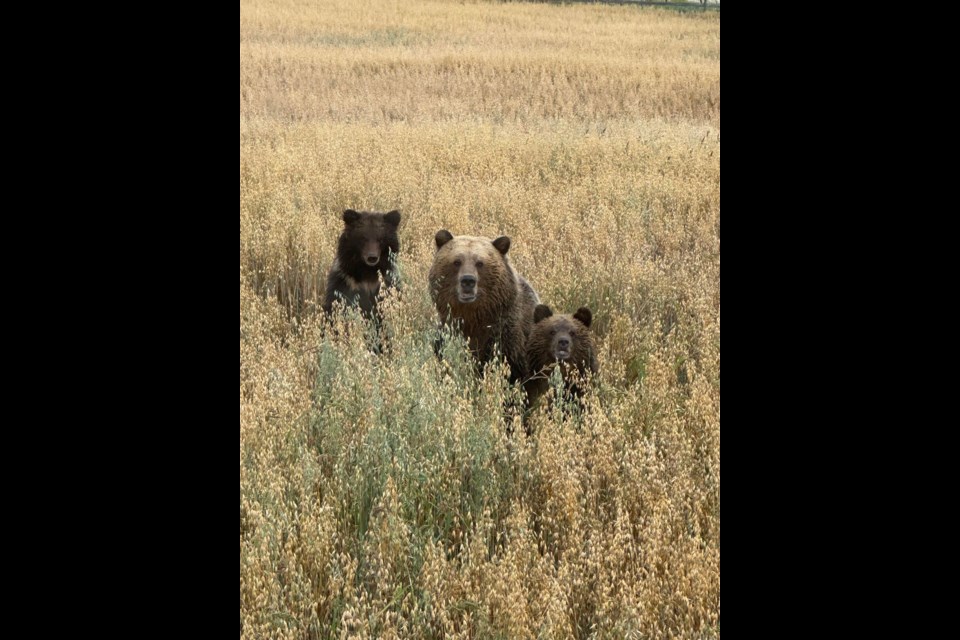Families in Pemberton Meadows say they are living in fear of a nearby grizzly and her cubs after children in the area have reportedly come face to face with the bear while playing outside. Residents say they are worried it is only a matter of time before someone is seriously hurt or killed.
Melissa and Bryce Ronayne said their family has been worried about the animal for several years now. “We have a female grizzly here,” said Melissa. “She first came here a few years ago and it was said that her behaviour was strange for a grizzly bear on the valley floor. We were told just to respect her space and leave her alone. Since then, she has raised four cubs. She has no fear of people; neither do her cubs.”
The Ronanynes said they have received very little support from the Conservation Officer Service (COS). “If we haze or make loud noises, she doesn’t care,” said Melissa. “It just feels like we are not getting any support from the COS.”
Recently, the parents’ fears were exacerbated when their children had a run-in with the grizzly. “I was getting the kids ready for school and they walked out the door in front of me,” said Melissa. “They went right into the grizzly bear. Luckily, they had just done a bear-spray workshop with Coast to Cascades [an organization dedicated to the recovery of the region’s grizzly population]. They knew enough to stop and back up slowly. I wasn’t too far behind them.”
Parents now meet their kids at the bus stop. “Now, one of us has to meet the kids at the bus with a shotgun or a truck,” said Melissa. “She’s always so close to the house. If the kids are in between her and her cubs, then it’s just not a good situation. “
Locals worry the bear has become too habituated to humans. “Because we were told to give her space, she never formed a fear of people,” said Melissa. “They were constantly people parking and taking pictures of her. She got used to vehicles and people being near her at all times.”
Melissa is worried someone will get hurt. “There are a lot of us who are afraid up here,” she said. “There are a lot of kids here. How do you just get used to having grizzly bears in your yard at all times?”
Susan Hellevang said the family of bears comes onto her property as often as three times a day. “We have the bears here continuously,” she said. “It’s this one family of bears. She has been here three years, and she is on her second set of cubs. She doesn’t leave the valley floor. My daughter got chased last Friday.”
In a statement to Pique, Erica Van Loon, a representative for the Coast to Cascades Grizzly Bear Initiative, said the group has been working in the Pemberton Meadows and other areas, collaborating with residents, government and other partners for several years.
“We have been making every effort to understand and find solutions to the grizzly bear issues that concern residents in the Meadows area, and we have been doing so at our own expense,” she said. “We conducted thorough analyses of bear movements across the valley, natural, seasonal food sources that bears may have used historically and still do, and human food-based attractants that may lead to unnatural bear behaviours in response to those attractants. Our aim is to allow grizzly bears to move across the Meadows in a way that is safe for both bears and residents. We continue to work with local farmers and other residents to secure attractants that should be off-limits to bears—whether black or grizzly—with electric fencing, proper storage and the provision of educational materials and workshops.”
Coast to Cascades stressed that residents need to remove all bear attractants from the area. “There are two outstanding needs that must be addressed to achieve optimal outcomes for both people and bears, with which most folks agree. One is that everyone in the Meadows area must take responsibility to secure their attractants—whether it be carrots, grain bins, garbage or fruit trees. Unfortunately, there are some residents that continue to have unsecured bear attractants and those may be holding bears in the Meadows area," Van Loon said.
Coast to Cascades also called for the hiring of a bear management specialist to deal with potential conflict in the region. “Successful coexistence requires compromises from both bears and human inhabitants. This balance has been shown to work in other regions with larger grizzly bear populations than those found in the Meadows area.”
Conservation officers have now set a trap for a grizzly bear in the area. "The COS is aware of grizzly bear activity in the Pemberton Meadows area. We understand this can cause concern for area residents," said David Karn of BC's Department of Environment & Climate Change Strategy. "Conservation Officers currently have a bear trap set for a grizzly bear that is causing property damage to infrastructure trying to access food rewards."
Conservation officers are also aware of other grizzly bears in the area. "Conservation Officers are also aware of additional grizzly bears in the area. To help ensure bears do not linger and create conflicts, we are asking the public to ensure their attractants are securely stored. Residents can help us by inspecting their yards and properties and ensuring any attractants, such as garbage, pet food or birdseed, are securely stored. Please ensure barbecues are clean and fruit is removed from trees and the ground.
"The COS is continuing to monitor bear activity in the area and will respond as necessary to ensure public safety. We ask residents to take precautions in case of wildlife encounters, such as leashing pets and never approaching bears. For more tips, please visit WildSafeBC. Reports of bear conflicts and aggressive bear behaviour can be made to the Report All Poachers and Polluters (RAPP) hotline at 1-877-952-7277."





